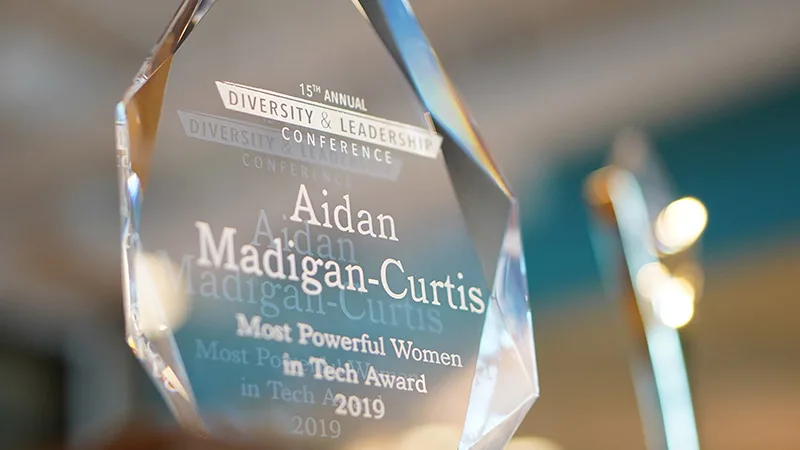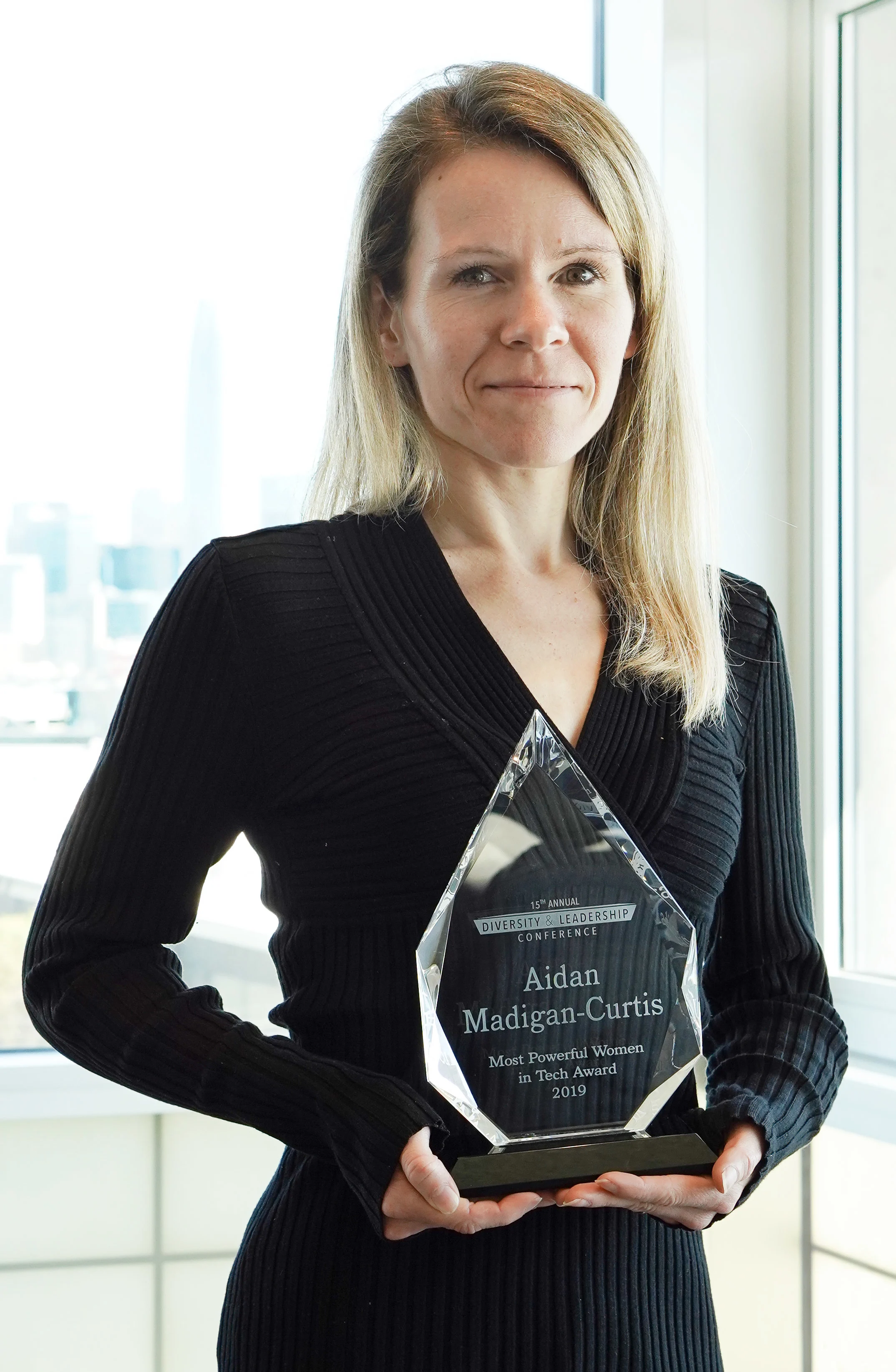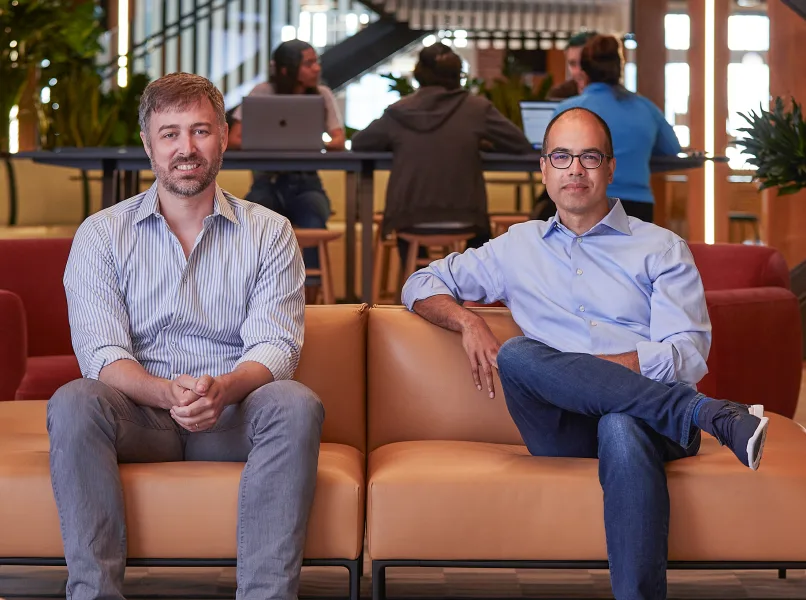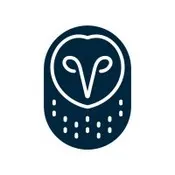
Get the latest from Samsara
Subscribe nowWe’re thrilled to announce that Aidan Madigan-Curtis, Samsara’s VP of Operations & Support, was named one of the 2019 Top 50 Women in Technology by the National Diversity Council. According to the Council, the list recognizes women who are molding the future of technology with their insight and leadership, and who excel in the workforce and inspire other women to do the same.
At Samsara, Aidan leads a 75-person team across Operations and Support. She has played a critical role in the development and launch of all of Samsara’s major hardware products. She also designed and operates Samsara’s robust global supply chain and quality management systems, overseeing the production and shipment of hundreds of thousands of Samsara devices each year. Prior to joining Samsara, Aidan helped launch the first AppleWatch and the iPhone6S as a member of Apple’s Global Operations team. She hails originally from Penticton, BC in Canada. She has an MBA and electrical engineering training from Stanford, and an undergraduate degree from Harvard University. She’s also a mom of a 10-month old daughter.
Aidan took a few minutes out of her busy schedule for an interview about her career at Samsara, her goals as a leader, and her perspective on diversity in the workforce.

Christina Bate, Sr. Director Marketing: Wow, Aidan, a huge congratulations on this award! What does this recognition mean to you?
Aidan Madigan-Curtis, VP Operations & Support: Thank you so much. I really see this more as a recognition of our incredible success at Samsara, and a reflection of the many women leaders who are growing up here, and of the way we promote from within and believe in diversity. I’m happy about the recognition because I’ve put a lot into Samsara, and I want it to be a beacon for people who want to work in a fair environment.
CB: You were a very early Samsara employee. What made you want to join?
AMC: I started at Samsara in February 2016. I joined because I was excited that my background would be relevant to help the company get started from an operations, manufacturing, and supply chain perspective. The company was still pretty small, I think I was employee 35, and I felt I would get the chance to wear a variety of different hats, which has always been attractive to me.
When I left Apple, I remember feeling like there was always somebody else, or a dozen people, or three dozen people available to catch balls if they were falling. I wanted to be in a place where I knew that all the effort I put in would really matter – where I would be the first, last, and only line of defense, and I would be uniquely able to make an impact.
CB: What role did you start out in?
AMC: I started as our New Product Introduction Lead. That meant figuring out where we were going to start manufacturing and building those new relationships, and spending a lot of time working on hardware development and setting up manufacturing lines.
CB: And now you oversee a lot more. How has your role changed over time?
AMC: I started with that base of supply chain and early hardware development. Within a few months of joining, there was eagerness to hand off early versions of our core software and cellular communications partnerships, and I was the least busy person to hand-off to. As our operations expanded and we grew our customer base and shipments, I also assumed responsibility for customer fulfillment and the order operations process. Then about a year ago, I worked with Kiren Sekar, Dan Pittelkow, and we also hired Josh LaMarche, to stabilize and scale our Support team after ELD compliance became critical for many of our customers. Our team also handles hardware demand forecasting.
In terms of level changes, year one was just hand-to-hand combat with everything we needed to do. About a year in, we started hiring others to take on some of the functions, and I acted as a mentor and guide to these folks. Eventually, I was promoted to Director and had the opportunity to create a team environment for Operations. So my role changed from doing stuff every day myself to half still doing the work where we had no team members, and half managing, leading, and growing a team. With the addition of Support and becoming a VP, I needed to think about how to rapidly scale a function in terms of headcount, systems, and process, and how to lead others through managing managers. My focus shifted to working with a leadership team to set goals, scalably measure progress, prioritize a long list of urgent and important needs for each department, and communicate clearly across a rapidly expanding, global group. Our Operations & Support team now comprise four offices and time zones across three countries.
CB: That’s a lot of increased responsibility in just three years. How do you make sense of your success?
AMC: I think that was partly my approach to my work, and partly the demonstrated philosophy Samsara’s leadership takes to promoting from within. When I came on, I just focused on delivering as much value as I could. I worked long hours but also had to be strategic about my time and actions, because there wasn’t enough of me or any of us to achieve our audacious goals in such a short period of time. It was all about creating leverage in our supply chain and operations through clever partnerships and scalable design. I had a great mentor and guide in Ben Calderon who shared many leverage-increasing strategies he’d employed in past companies to help us craft a strong path forward for Operations at Samsara.
Along the way our executive leadership team had the chance to work with me, and they gave me the opportunity to continue to scale in what I was doing. I’m very thankful they took a chance on me, and I strive every day to live up to the challenges they’ve handed me.

CB: What do you mean by that – them taking a chance on you?
AMC: I think there are a lot of places I could have gone where for any number of reasons – be they politics, or culture, or hierarchy – the same opportunities wouldn’t have existed. Samsara is a place where our fast growth creates a lot of opportunities for people excited to jump up and volunteer for it, and in my case, where the leadership team was willing to let me try new things.
They could have hired externally multiple times, and instead they let me try. That’s always a bet; they just bet in my direction. I still remember that from my very first conversation with Sanjit, in my interview – he was very clear in saying, we really believe in promoting from within. In my experience, the leadership team absolutely followed through on that.
CB: What do you love most about your job these days?
AMC: I feel very close to all the people we’ve hired in the Operations & Support organization. If they’ve been here for longer than a month, I know their stories. I know what they’re shooting for and I’m excited to help them achieve what they’re looking to achieve here. It would be hard to be motivated every day if I weren’t passionate about the people I’m working with, so there’s a sense of responsibility plus excitement that I get to influence people’s lives.
I also love being part of a company where I see how we go above and beyond for our customers. We never make decisions without putting our customers’ interests first, that’s a core principle, and I’m proud to work for a place that knows that’s the right long-term strategy for success. It fits my values, and also I think it’s smart.
CB: Why do you see diversity and inclusion as being important in the workplace?
AMC: There’s been a lot of research that is compelling around why having diverse viewpoints and inputs creates a richer environment. It makes sense that when you look at a problem from multiple angles, you tend to come up with a smarter answer. I think that one of the most dangerous things for any group of people – for companies or even for societies – is a lot of groupthink. If you have access to a diversity of perspectives, and if you really listen, it often leads to a moment of “Oh, I totally hadn’t considered it from that angle.” So you’re better equipped to understand what an employee or customer or vendor is experiencing. You really need that insight to create a stronger business strategy.
CB: Do you feel that being a woman has been relevant – or not – in your professional life?
AMC: I’ve worked in a lot of environments where I was the only woman in the room – in Finance, at Business School, working at tech companies. I would say I wasn’t particularly aware of myself as a minority, as a female, even if I was one. I never felt I couldn’t speak out or that people didn’t want to hear my perspective.
CB: How do you see Samsara investing in diversity and inclusion?
AMC: It starts from the top, in terms of the principles we’ve set as a company. We want to create a fair and equitable workplace. What I see happening here is everyone’s voice having value in meetings, regardless of gender, age, race, sexuality – I hope we’ve created an environment that is inclusive in that way.
I also see a lot of responsiveness from our People Ops team in terms of training new managers about diversity, and in creating forums for different groups of people to create communities for themselves around diversity topics, and we’ve funded those programs and trainings. As a company, there’s a lot of energy behind trying to do the right thing. To me, the most important thing is the receptiveness from our leadership team to hear concerns, and I hope that people feel heard.

Get the latest from Samsara
Subscribe now
















